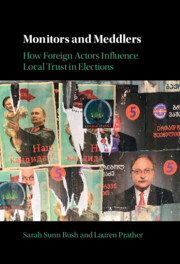Crossref Citations
This Book has been
cited by the following publications. This list is generated based on data provided by Crossref.
Gulotty, Robert
and
Luo, Zhaotian
2021.
Fire Alarm Fatigue: How Politicians Evade Accountability.
SSRN Electronic Journal,
Levin, Dov H.
2023.
Is sunlight the best counterintelligence technique? the effectiveness of covert operation exposure in blunting the Russian intervention in the 2020 U.S. election.
Intelligence and National Security,
Vol. 38,
Issue. 5,
p.
816.
Bartels, Larry M
Daxecker, Ursula E
Hyde, Susan D
Lindberg, Staffan I
and
Nooruddin, Irfan
2023.
The Forum: Global Challenges to Democracy? Perspectives on Democratic Backsliding.
International Studies Review,
Vol. 25,
Issue. 2,
Bush, Sarah Sunn
Cottiero, Christina
and
Prather, Lauren
2024.
Zombies ahead: Explaining the rise of low-quality election monitoring.
The Review of International Organizations,
Pinto, Pablo M
Rickard, Stephanie J
and
Vreeland, James Raymond
2024.
The Effect of International Actors on Public Support for Government Spending Decisions.
International Studies Quarterly,
Vol. 69,
Issue. 1,
Nomikos, William G.
and
Stollenwerk, Eric
2024.
More Security, More Trust? Security Perceptions as a Source of Government Trust in Post-Conflict Settings.
Journal of Intervention and Statebuilding,
p.
1.
Cohen, Mollie J
and
Sheagley, Geoffrey
2024.
Partisan Poll Watchers and Americans’ Perceptions of Electoral Fairness.
Public Opinion Quarterly,
Vol. 88,
Issue. SI,
p.
536.
Gieczewski, Germán
and
Shadmehr, Mehdi
2024.
Fraud-proofing Beyond Election Monitors: An Institutional Design Approach.
SSRN Electronic Journal,
Levin, Dov H
2024.
Introducing PEIG 2.0: Sixty-nine years of partisan electoral interventions 1946–2014.
Conflict Management and Peace Science,
Coll, Joseph A.
2024.
Securing Elections, Securing Confidence? Perceptions of Election Security Policies, Election Related Fraud Beliefs, and Voter Confidence in the United States.
Election Law Journal: Rules, Politics, and Policy,
Vol. 23,
Issue. 2,
p.
173.
Curtice, Travis
and
Crabtree, Charles
2024.
Democratic Erosion, Partisanship, and Election Observers: Evidence from a Survey Experiment.
International Interactions,
Vol. 50,
Issue. 4,
p.
567.
Kerr, Nicholas
2024.
Electoral Commissions and Democratization in Africa.
Kerr, Nicholas
King, Bridgett A
and
Wahman, Michael
2024.
The Global Crisis of Trust in Elections.
Public Opinion Quarterly,
Vol. 88,
Issue. SI,
p.
451.
Mattingly, Daniel
Incerti, Trevor
Ju, Changwook
Moreshead, Colin
Tanaka, Seiki
and
Yamagishi, Hikaru
2024.
Chinese state media persuades a global audience that the “China model” is superior: Evidence from a 19‐country experiment.
American Journal of Political Science,
Debre, Maria J
2025.
How Regional Organizations Sustain Authoritarian Rule.
Levin, Dov H
and
Musgrave, Paul
2025.
To What End? Policy Objectives and US Public Support for Political Warfare.
Foreign Policy Analysis,
Vol. 21,
Issue. 2,



